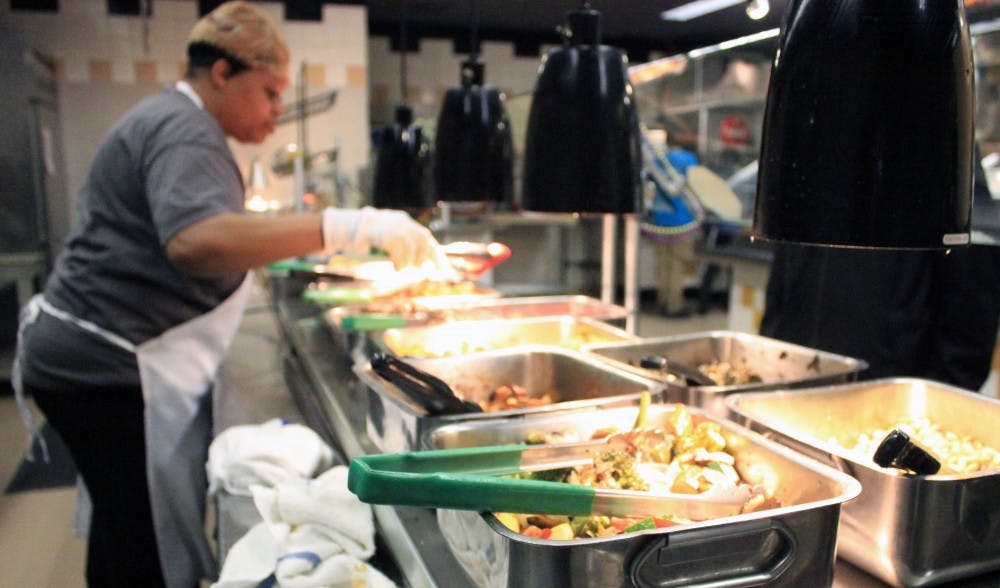
This Wednesday, Hill dining hall will begin donating unserved food to the hungry locals in Philadelphia.
Credit: Ritika PhilipSpare food at the Hill College House dining hall will no longer go to waste. Wednesday marks the expansion of Penn Dining and Bon Appétit’s food recovery program, an operation that donates unserved food to hungry locals in Philadelphia.
At the start of the 2014 fall semester, 1920 Commons was the first dining facility to practice food recovery, a process of preserving unused food instead of throwing it away. All perishable food prepared in Commons not served in a given week is frozen, put on a truck and donated to a Philadelphia charity. Bon Appétit’s food recovery program now includes Hill, and the program will likely expand to include other dining facilities in the future, Resident District Manager of Bon Appétit Stephen Scardina said.
The idea for beginning food recovery at Penn came in spring of 2014, when a group of students in the academically based community service course “The Politics of Food” proposed such a program to Penn Dining and Bon Appétit. The course was taught by political science professor Mary Summers, who specializes in the subject. College senior Joyce Kim was a member of the group that made the original proposal.
Summers and the group worried about leftover but recoverable dining hall food being thrown away “while students in West Philadelphia are starving,” Kim, who is also president of the Undergraduate Assembly, wrote in an email.
“Bon Appétit and Penn Dining were receptive but it took much work — this includes working with the UA to show that this is something students were invested in and culminating in a comprehensive 40 page report that we presented to Penn Dining,” Kim added.
The group worked with Bon Appétit fellows Claire Cummings and Nicole Tocco to orchestrate a food recovery program for Penn Dining. Fellows make campus visits once a year to educate Bon Appétit staff and support increased sustainability practices, Bon Appétit Marketing Manager Beth Baryd said. They determined how best to go about food recovery to support the local Philadelphia community.
“Bon Appetit is doing food recovery in other accounts across the country,” Scardina said. “We were happy and excited to bring something similar to Penn last fall.”
Bon Appetit works nationally with an organization called Feeding America, which helped identify the local food bank Philabundance to manage Penn’s food recovery program. Philabundance identified Salvation Army Pioneers to ultimately receive recovered dining hall food from Penn.
Any food that is not served is properly labeled, frozen and donated. Salvation Army Pioneer Corps will pick up frozen food from Commons and Hill once a week. Commons currently donates approximately 30 to 35 pounds of frozen food every week, and Scardina expects that Hill will donate 25 to 30 pounds weekly.
“In the fall semester, we donated 2,600 pounds of food that could be recovered from 1920 Commons alone,” Scardina said. With the addition of Hill to the program, the food recovery efforts will nearly double.
As Bon Appétit closed down operations on campus for this past winter break, the perishable food that was left was sure not to go to waste. “We took all the perishable food that we had left and donated it to Philabudance to serve in their kitchens throughout the city,” Scardina said. The food donated before winter break amounted to over 300 pounds. While it is unclear exactly how many people are fed with Penn’s recovered food, the Salvation Army of Greater Philadelphia serves food from Penn twice a week.
Food recovery comes at virtually no cost to Bon Appétit and Penn Dining. “The only thing that costs us are the tin foil pans we give the food in,” Scardina said. “And we are even looking to replace those with reusable crates to be as sustainable as we can.”
“We are happy to be working through Philabudance, because despite what you might think, there are a lot of restrictions placed on donating food,” Director of Communications for Business Services Barbara Lea-Kruger said. Any donated food must be approved to be safe, healthy and properly labeled. She said the organization has provided Penn with clear guidelines for food storage and labeling. “That was always the stumbling block for Penn to donate food in the past, but Philabudance makes it easier for us.”
The Daily Pennsylvanian is an independent, student-run newspaper. Please consider making a donation to support the coverage that shapes the University. Your generosity ensures a future of strong journalism at Penn.
DonatePlease note All comments are eligible for publication in The Daily Pennsylvanian.








